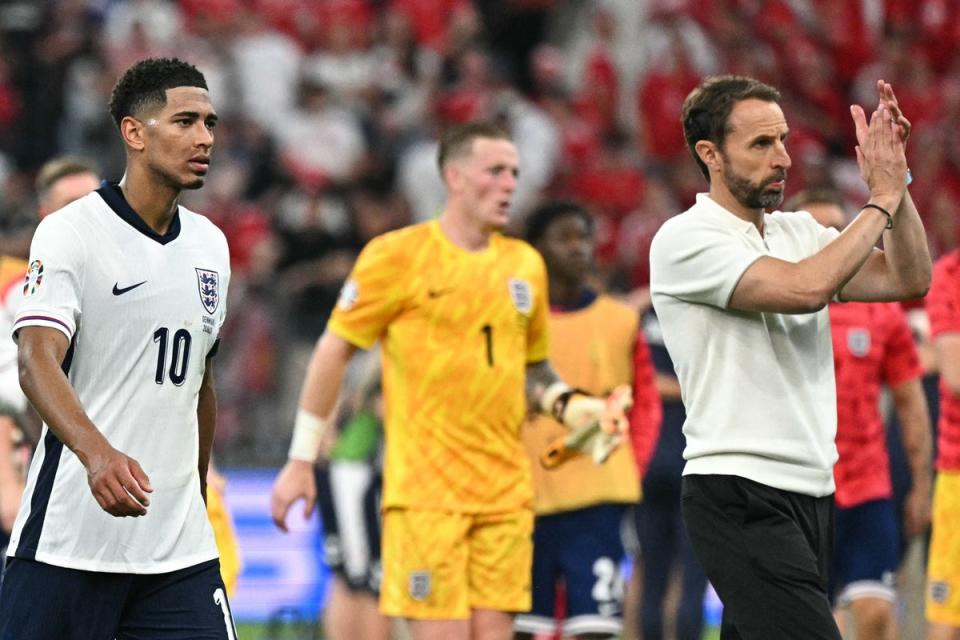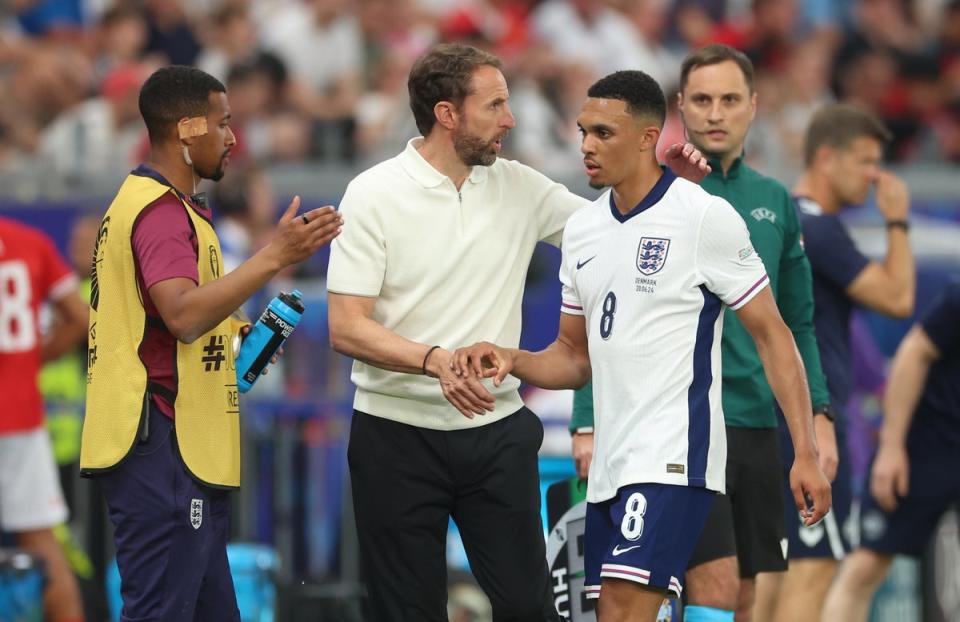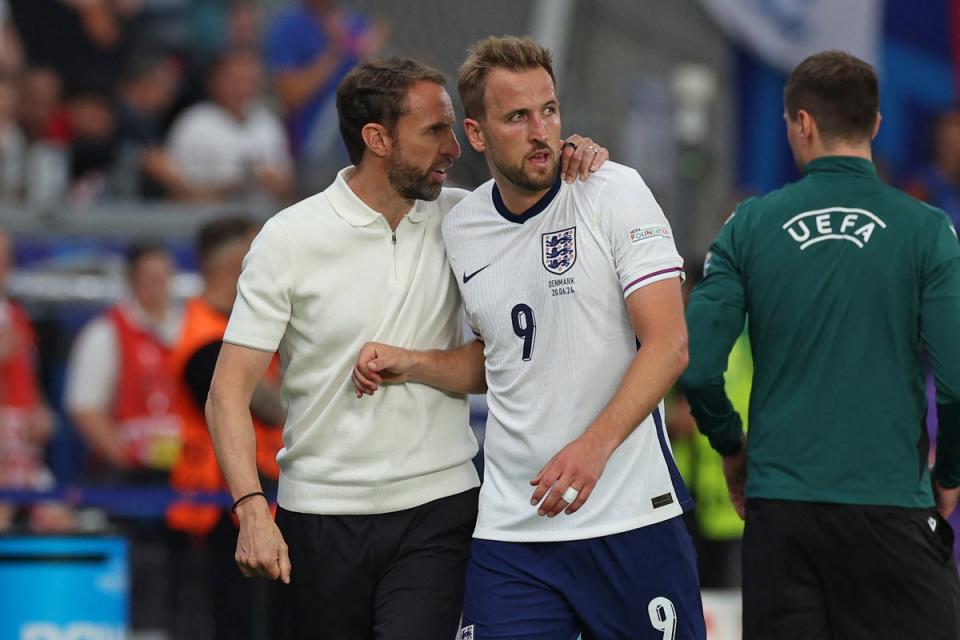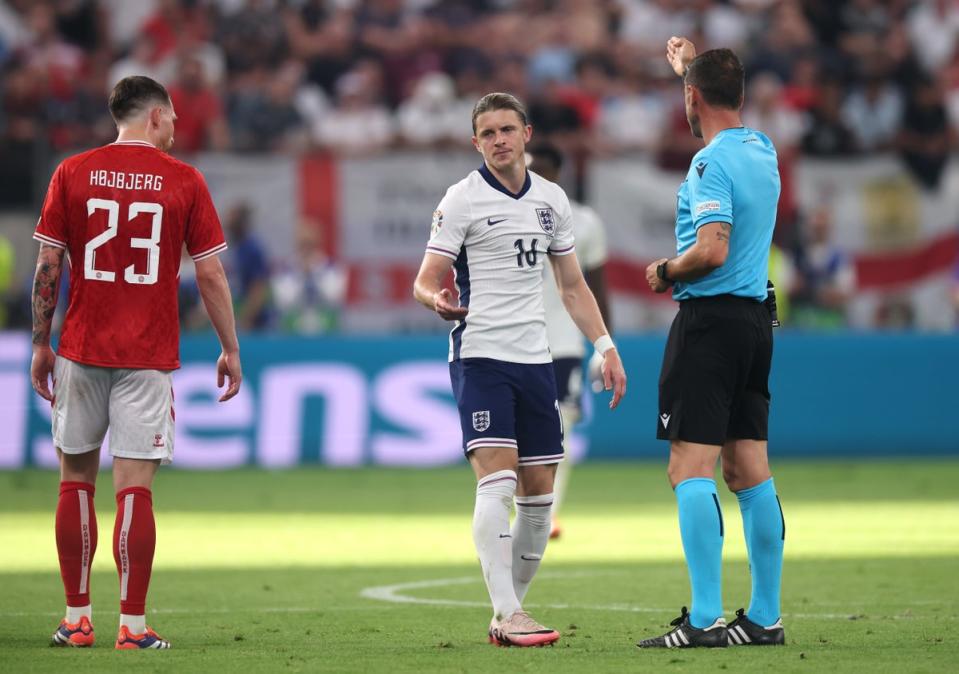England caught between midfield ideals amid search for attacking balance

There was a problem with the team of all the talents. It wasn’t a team. In as much as there is any agreement on anything concerning the England team, Gareth Southgate may have thought he had given the people what they wanted. He had crammed in his four most gifted attackers and a generational talent of a passer, primed to supply them.
And in Trent Alexander-Arnold’s parting contribution, he almost got a glimpse of what might have been.
Southgate thinks Alexander-Arnold is a quarterback of a midfielder. And if an up-and-under seemed borrowed from rugby rather than American football, it resulted in Bukayo Saka heading into the side netting. But by then, the decision had been made. A minute later, Alexander-Arnold was withdrawn, Conor Gallagher introduced in the 1-1 draw with Denmark.
Southgate experimented with an artist in his midfield and ended up with a loyal labrador. Gallagher cannot do what Alexander-Arnold can on the ball. But the Liverpool right-back cannot do what the Chelsea runner does without it. Gallagher hustles and harries. At times, he doesn’t do much else. He was booked within a few minutes for ploughing into Andreas Christensen. English football has a historic love of conspicuous effort and, very obviously, Gallagher is a player who tries.
English football also has a host of historic weaknesses. Not knowing what to do with the unconventional is one.
Alexander-Arnold is not a maverick in personality, not a loose cannon, but his skillset is unique. Another traditional weakness is a failing midfield: gifted as the individuals sometimes are, England can look less cohesive than many an elite opponent. Alexander-Arnold was in a position where England needed him to knit the team together. Instead, it was disjointed, England less than the sum of their considerable parts.
It was not all his fault. Yet the nature of tournament football is that experiments sometimes have to be aborted. The side that starts the group stage does not necessarily end the knockout stages. Even on a day when Southgate substituted his whole front three, Alexander-Arnold looks the most fallible.
Jurgen Klopp’s Liverpool long excelled at playing to his strengths. Denmark exposed a novice midfielder’s weaknesses. Or perhaps England did.

Christian Eriksen apart, Denmark’s is not a particularly technical team. Yet there was an assurance, an understanding, a capacity to head for pockets of space. England were outmanoeuvred; not by the Danes’ front two but by the trio behind them. By half-time, Denmark’s three central midfielders had attempted two shots apiece; the first, from Pierre-Emile Hojbjerg, came after barely 20 seconds. It could be seen as a warning shot: when Morten Hjulmand levelled, no one tried to close him down until Saka made a belated effort.
And part of the difficulty for a newcomer to midfield like Alexander-Arnold is the positioning, and part the pressing. It is a question of timing, of teamwork; of managerial strategy too.
England rarely lack effort but more garlanded managers than Southgate, such as the Serie A winners Sven-Goran Eriksson and Fabio Capello, have seen their sides look outwitted and outclassed in midfield. It has been a theme of English football over the years, one that long predates the Southgate reign.

Mesut Ozil destroyed England in the 2010 World Cup, Gareth Barry panting in desperate pursuit. Andrea Pirlo conducted a personal waltz away from them in 2012 and then 2014; first as a regista, then in a more advanced role. Luka Modric, Ivan Rakitic and Marcelo Brozovic decide not to give Southgate’s side the ball in the 2018 World Cup semi-final. Jorginho and Marco Verratti elegantly wrested control of the Euro 2020 final away from them.
As England floundered in Frankfurt, Southgate may have been pining for two he had to cull from his plans, unflashy favourites who could protect a defence, paragons of past tournaments. First Kalvin Phillips made himself unselectable. Then Jordan Henderson did, more on grounds of fitness. If Southgate could pluck a player from England’s past to put in the current team, it might not be the 1966 Bobby Charlton – this side are scarcely short of attacking talent – as much as the 2018 version of Henderson or Phillips in his 2021 form.
Or maybe the 2006 Owen Hargreaves or the Paul Ince of 1996; someone, at any rate, to sit alongside Declan Rice, complement him and add solidity. Even with Gallagher on, England looked too open. They kept letting Hojbjerg shoot.

This was why Southgate kept ignoring the evidence, kept picking Henderson when he was playing in Saudi Arabia, and Phillips when he wasn’t playing in England.
He wanted another workmanlike midfielder to bring a dose of dullness, to help the defenders defend and let the attackers attack.
Instead, he turned to Alexander-Arnold. And now, while the rookies Adam Wharton and Kobbie Mainoo remain in reserve, Southgate may replace the Liverpool man with Gallagher. And the instruction video may not be a compendium of Alexander-Arnold’s greatest passes but a compilation of Phillips and Henderson closing players down.

